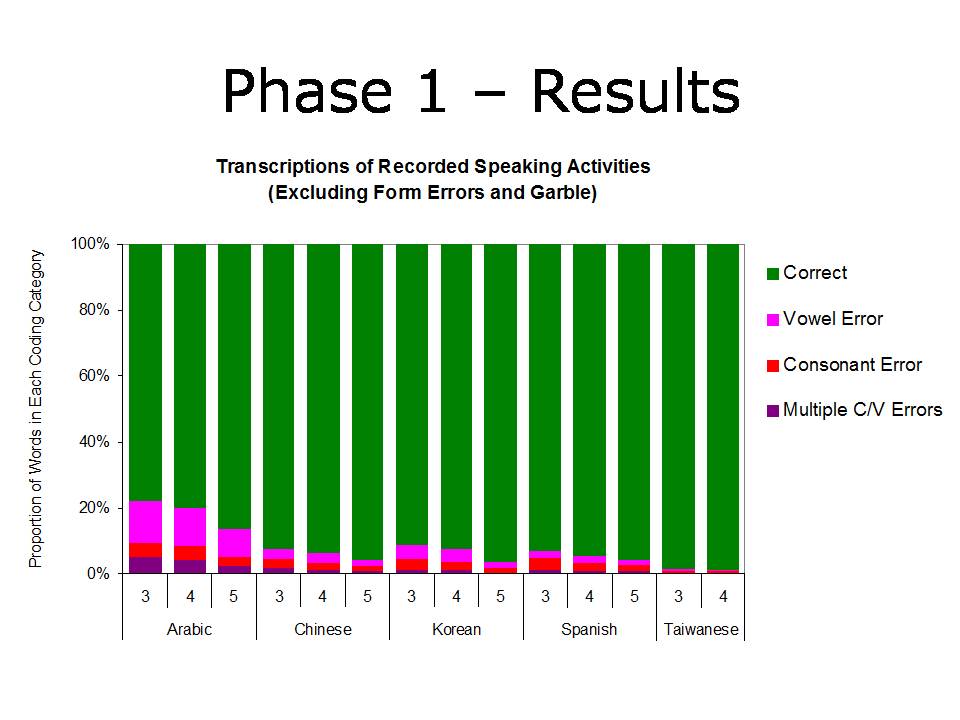Difference between revisions of "Orthography"
Susan-Dunlap (talk | contribs) |
Susan-Dunlap (talk | contribs) m |
||
| (19 intermediate revisions by the same user not shown) | |||
| Line 1: | Line 1: | ||
| − | ==Lexical Quality of English Second Language Learners: | + | ==Lexical Quality of English Second Language Learners:<BR>Effects of Focused Training on Orthographic Encoding Skill== |
| − | |||
==Authors:== | ==Authors:== | ||
Susan Dunlap, Benjamin Friedline, Alan Juffs, Charles A. Perfetti | Susan Dunlap, Benjamin Friedline, Alan Juffs, Charles A. Perfetti | ||
| − | ==The Research Problem:== | + | ==The Research Problem:== |
| − | Arabic L1 students of ESL have poorer | + | Arabic L1 students of ESL have poorer orthographic representations (i.e., spelling) than other L1 backgrounds (e.g., Korean, Chinese, Spanish). This difference cannot be accounted for by L1 writing system, L1 orthographic depth, or L2 vocabulary knowledge/fluency.<BR> |
| − | Can an intervention using focused, meaning-based encoding increase the quality of lexical representations for these learners? | + | Phase 1 -<BR> |
| + | Can we statistically confirm teacher observations of L1 background differences in spelling ability of ESL students?<BR> | ||
| + | Phase 2 -<BR> | ||
| + | Can an intervention using focused, meaning-based encoding increase the quality of lexical representations for these learners?<BR> | ||
| − | ==The Intervention Design:== | + | ==Background and Significance:== |
| − | Subject (between-subjects) Variables -- L1; ESL Level | + | |
| − | Independent Variable (within-subjects) -- training condition (form only, form+meaning) | + | ==The Intervention Design:== |
| + | Subject (between-subjects) Variables -- L1; ESL Level<BR> | ||
| + | Independent Variable (within-subjects) -- training condition (form only, form+meaning)<BR> | ||
Dependent Variables -- accuracy on audio dictation and spelling recognition tasks; gains from pre-test to post-test | Dependent Variables -- accuracy on audio dictation and spelling recognition tasks; gains from pre-test to post-test | ||
| + | |||
| + | ==Results:== | ||
| + | Results of Phase 1 show that:<BR> | ||
| + | - Arabic L1 group makes more errors compared to other L1 groups; this difference persists through Level 5<BR> | ||
| + | - Vowel errors were the most prevalent for Arabic L1<BR> | ||
| + | - For all L1 groups, errors decrease from Level 3 to Level 5<BR> | ||
| + | [[Image:phase1results.jpg]] | ||
| + | <BR> | ||
| + | Results of Phase 2 show that:<BR> | ||
| + | - There was some improvement from pre-test to post-test scores on audio dictation (spelling) and spell check (lexical decision) tasks.<BR> | ||
| + | [[Image:Slide7.jpg]] | ||
| + | |||
| + | ==References:== | ||
Latest revision as of 16:26, 2 June 2009
Contents
Lexical Quality of English Second Language Learners:
Effects of Focused Training on Orthographic Encoding Skill
Authors:
Susan Dunlap, Benjamin Friedline, Alan Juffs, Charles A. Perfetti
The Research Problem:
Arabic L1 students of ESL have poorer orthographic representations (i.e., spelling) than other L1 backgrounds (e.g., Korean, Chinese, Spanish). This difference cannot be accounted for by L1 writing system, L1 orthographic depth, or L2 vocabulary knowledge/fluency.
Phase 1 -
Can we statistically confirm teacher observations of L1 background differences in spelling ability of ESL students?
Phase 2 -
Can an intervention using focused, meaning-based encoding increase the quality of lexical representations for these learners?
Background and Significance:
The Intervention Design:
Subject (between-subjects) Variables -- L1; ESL Level
Independent Variable (within-subjects) -- training condition (form only, form+meaning)
Dependent Variables -- accuracy on audio dictation and spelling recognition tasks; gains from pre-test to post-test
Results:
Results of Phase 1 show that:
- Arabic L1 group makes more errors compared to other L1 groups; this difference persists through Level 5
- Vowel errors were the most prevalent for Arabic L1
- For all L1 groups, errors decrease from Level 3 to Level 5

Results of Phase 2 show that:
- There was some improvement from pre-test to post-test scores on audio dictation (spelling) and spell check (lexical decision) tasks.
